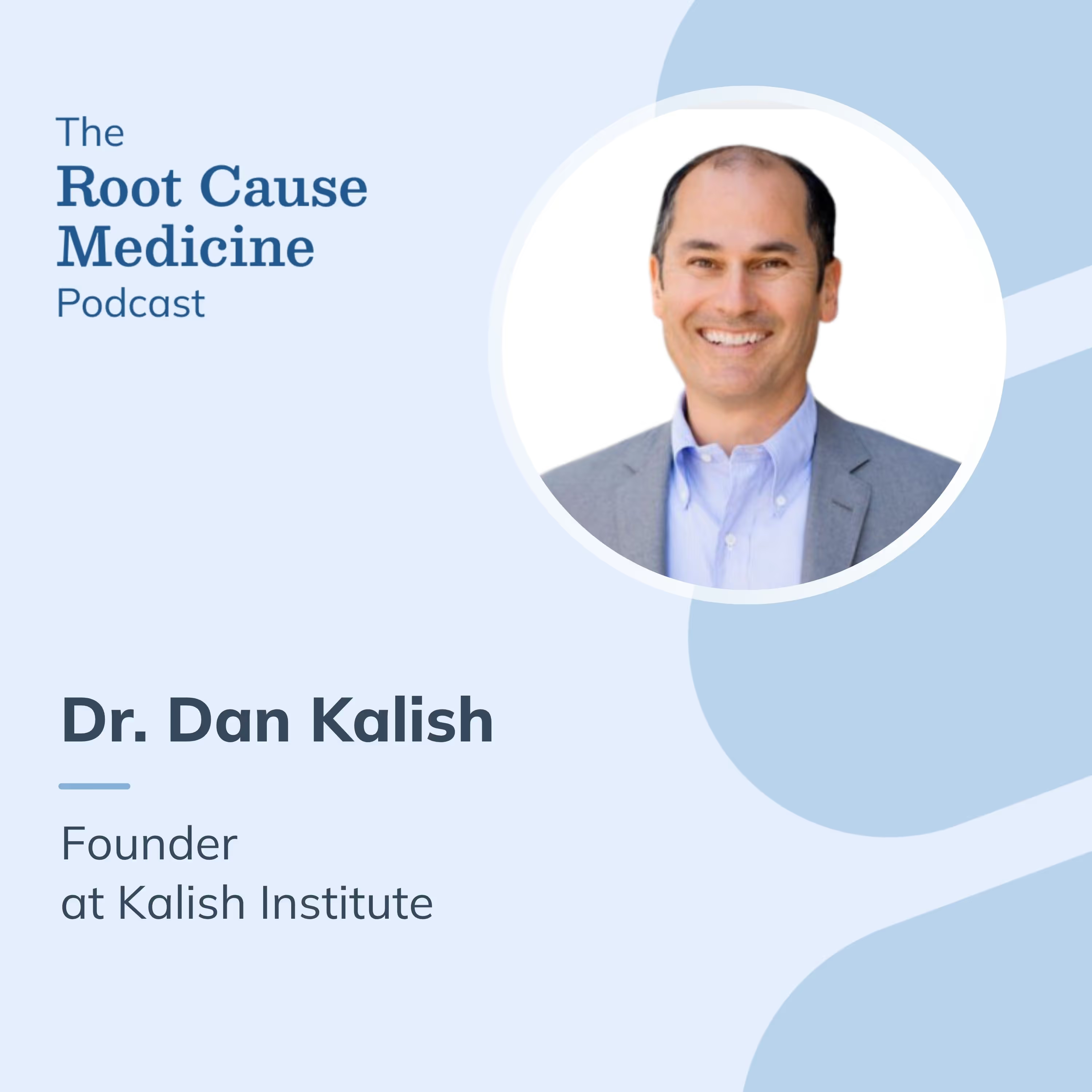
Pricing
Practitioners
Patients
Education
Pricing
Practitioners
Patients
Education



In this episode, Dr. Daniel Kalish shines a light on topics such as amino acids, longevity, mitochondria, cellular repair, and the importance of maintaining muscle mass for longevity and overall health.
Dr. Daniel Kalish, the visionary behind the Kalish Institute, has established an esteemed online training program devoted to cultivating Functional Medicine practices. Since its inception in 2006, the Kalish Institute has been instrumental in shaping practice models for over 1,000 practitioners worldwide.
Driven by a steadfast commitment, Dr. Daniel Kalish passionately imparts Functional Medicine philosophy and practices to fellow physicians. In 2016, he collaborated on a groundbreaking research study titled "Evaluation of a Functional Medicine Approach to Treating Fatigue, Stress, and Digestive Issues in Women," which meticulously examined the efficacy of various treatments and protocols.
Furthermore, Dr. Kalish's knowledge and expertise are encapsulated in three influential books: "The Five Pillars to Building a Successful Practice," "The Kalish Method: Healing the Body, Mapping the Mind," and "Your Guide to Healthy Hormones." Renowned for his profound insights, Dr. Kalish is frequently sought after as a speaker at integrative medicine conferences throughout the United States.
Key Takeaways:
The importance of amino acids in protein synthesis and overall health
Amino acids are the fundamental components of the proteins within your body, including vital proteins like hemoglobin, thyroid hormones, and insulin. Astonishingly, muscle insulin, hemoglobin, and other essential proteins are constructed using the same set of twenty amino acids in nearly identical proportions. A deficiency in any one amino acid can negatively impact multiple proteins in the body, as all proteins, except collagen, are made from the same twenty amino acids in similar ratios.
Essential versus non-essential amino acids
Essential amino acids are crucial components that our bodies are unable to synthesize independently and must be acquired through diet or supplementation. They are the specific amino acids that can only be obtained from food sources. In contrast, non-essential amino acids are synthesized by our bodies through genetic processes that convert one amino acid into another. While all amino acids play vital roles, the absence of essential amino acids can lead to protein-related complications. It is important to note that the issue lies not in the availability of essential amino acids, as they are readily available in various foods, but rather in their proper utilization and conversion within the body.
Solving amino acids issues
Some of the most common issues that can lead to amino acid deficiencies are poor digestion and utilization due to stress. You might be eating enough protein, but your digestion might not work well and won't break down proteins into amino acids. You can also have a utilization issue where you're burning through or using up your amino acids at an extreme rate. You might be stressed, and your body produces a lot of adrenaline.
Properly chewing food helps improve protein digestion and absorption. Also, eating in a relaxed setting and taking time to chew food can help alleviate digestive issues and improve overall health. It's significant to acknowledge you shouldn't take amino acids without a clear understanding of deficiencies. It's always better to test to ensure proper supplementation.
Improving mitochondrial health
Mitochondria are your cellular powerhouses. You can improve your mitochondrial health by breaking down old and poor-quality mitochondria and building new ones using amino acids. To achieve that, use intermittent fasting. Additionally, free-form amino acids can help build new mitochondria, while the organic acid test can provide insights into mitochondrial markers and patterns. Moreover, you can stimulate the growth of new mitochondria with amino acid powders taken on an empty stomach.
Maintaining muscle mass for longevity and overall health
You can stimulate the growth of mitochondria by stimulating mTOR, which stands for the mammalian target of rapamycin. There's a big emphasis now in the longevity community to inhibit mTOR for preventing cancer and other chronic diseases. mTOR can be inhibited or stimulated for certain benefits.
The muscle cells themselves and the muscle tissues are dense with mitochondria. There are around 10,000 mitochondria in every muscle cell. So the most important determinant of how long you live is your muscle mass.
The muscle on your body is different from the adipose. It all goes down to strength, and there are some general strength tests you should be able to perform based on your body weight. For example, you should be able to deadlift your bodyweight, farmer's carry with half your body weight for two minutes, or hold a wall squat for a minute.
Learn more about Dr. Dan Kalish:
Rupa Health Details:
If you enjoyed this episode then please either:
The Root Cause Medicine Podcast is handcrafted by our friends over at: fame.so
Previous guests include: Dr Cheryl Burdette of Dunwoody Labs, Cynthia Thurlow of Everyday Wellness, Dr. Stephanie Estima of Hello Betty, Keri Anania of Nebraska Functional Medicine, Dr. Ralph Esposito of Athletic Greens, Dr. Rob Silverman of Westchester Integrative Health Center, Dr. Elizabeth Yurth of Boulder Longevity Institute and Dr. Mindy Pelz of Dr. Mindy Pelz Co.
Check out our three most downloaded episodes: